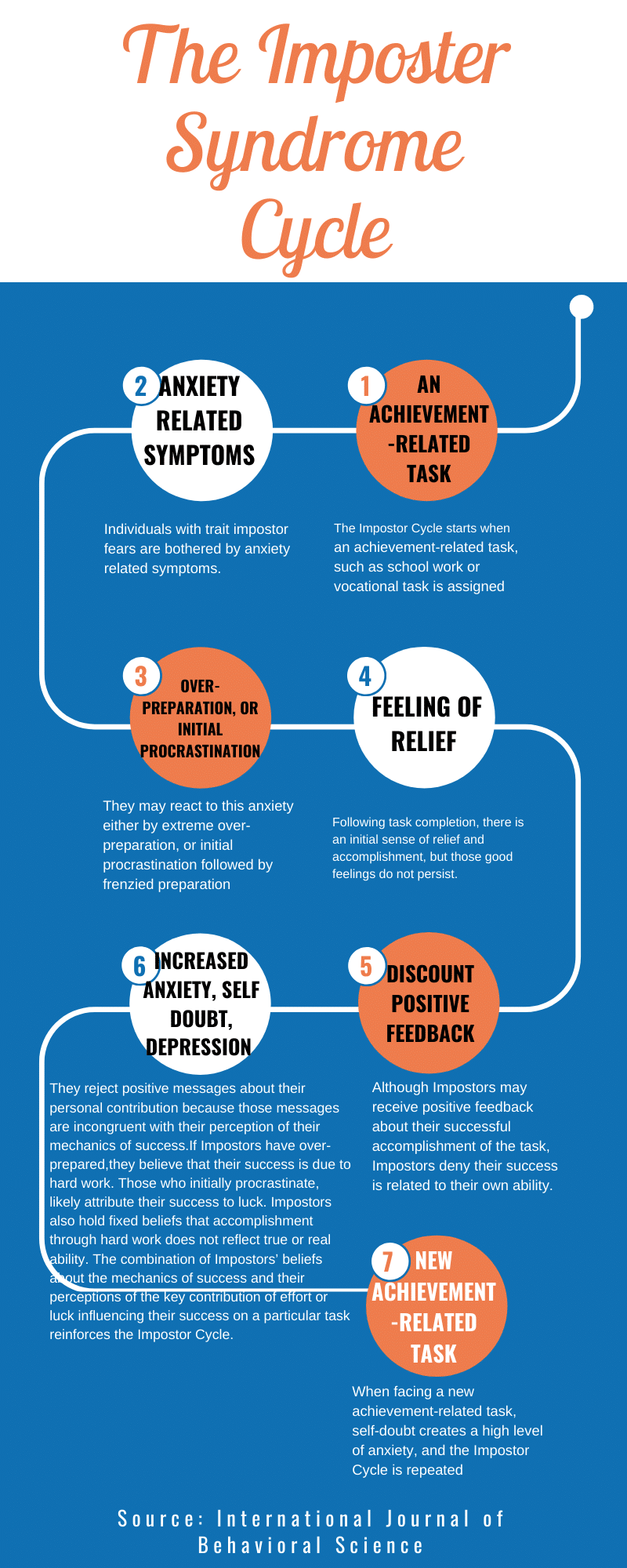You finish the task again without any problem.
Now everyone will tell you that you did a great job, that you a genius, a perfect guy who can do everything.
On your site, You don’t know what to do, how to react.
The same question is always in your mind:
When will people realize that there was nothing unusual in the task, you finished?
What will happen when they realize your fraudulence?
What will look like their reaction when someone checks and find you are not as successful as people treat you.
You know what? You are not alone. 70% of people feel like you at some period in their life. Don’t worry. There is nothing wrong with you.
You have Imposter/Impostor Phenomen well known as Imposter/Impostor Syndrome
What is Imposter Syndrome?
Impostor syndrome is a constant feeling which causes people to doubt their accomplishments despite evidence and persistent fear they may be exposed as a fraud.
The only difference between Impostors and the others is that during that same situation, imposters think different thoughts.
Now when you realize nothing is wrong with you, read the rest of the article to find the factors which cause imposter syndrome, what does imposter syndrome feel like, find your type of imposter syndrome, test yourself to find in which type you belong to and see how can you overcome it
Why do we get imposter syndrome? Which Factors Contribute to Impostor syndrome? Which are imposter syndrome symptoms?
These are common questions of every person with imposter syndrome.
To answer these questions is very hard. There is no one single answer.
According to some experts, personality traits, such as perfectionism and neuroticism on the one side or anxiety and depression of the other, can contribute to the emergence of Imposter Syndrome.
The other experts believe family relationships or behavioral causes can leave a lasting impact.
Childhood memories that grades were not good enough for their parents, or that their siblings outshone them in certain areas, can cause the imposter syndrome.
Also, Children who are raised that they are superior in talent, intelligence, appearance, can develop impostor syndrome when they struggle to achieve something
What does imposter syndrome feel like?
Here are some of the common thoughts and feelings associated with imposter syndrome
“I must not fail” Imposters are under a tremendous amount of pressure all the time. They can’t enjoy the success because it brings to the enormous burden of responsibility and visibility.
“I feel like a fake” Almost all Imposters believes that they lack expertise or knowledge and don’t deserve professional accolades or success.
They are under fear all the time that “somebody made a mistake.” and they don’t deserve a promotion or a position. Continuous stress that they will be unmasked or discover leads to anxiety, lower self-esteem, and depression.
“It’s all down to luck,” Impostors thinks that all achievements are because of the luck or other external reasons and not because of their abilities. The thoughts “I just got lucky” are accompanied with the fear they will fail the next time
“Success is no big deal.” Imposters think their success is due to luck, having fooled others, or the right timing. All impostors have a problem with accepting success and compliments.
To understand what does imposter syndrome feels like, I create an infographic where I explained the imposter syndrome cycle. You can see the imposters/impostors’ feelings from the beginning to the end of the period (cycle).
The Imposter Syndrome Cycle (Infographic)
What does imposter syndrome feel like? The Impostor Cycle
Test yourself with this imposter syndrome test
Do you want to test yourself with this imposter syndrome test? If you have some friend or relative who suffers as you send them the test too
Answer the questions in the impostor syndrome test and check the degree to which they apply to you.
The Impostor Test was developed by Dr. Pauline Clance to help people to determine whether or not they have Impostor Syndrome and, if so, to what extent they are suffering. When you will take the Impostor Test, add together the numbers of the responses to each statement. At the end of the test are explanations of scores, so you can see in which degree Impostor Phenomenon interferes in your life.
When will you see your results continue reading to find in which imposter syndrome type do you belong?
5 Types of impostor syndrome. In which one do you belong?
According to Valerie Young, a leading expert on impostor syndrome, and author of The Secret Thoughts of Successful Women: Why Capable People Suffer From Impostor Syndrome and How to Thrive In Spite of It there are 5 types of Imposter Syndrome
1. The Perfectionist
All Perfectionists have Imposter syndrome. Perfectionists set a very high level of achievement of their goals. When they fail to meet a goal, they’re going to feel like a failure. This attitude leads to self-doubt, anxiety, and depression
Perfectionists are rarely satisfied with their work. They believe they could’ve done everything better and skip to celebrate the things they did well.
2. The Superwoman/man
Superwomen/man wants to succeed in all aspects of their life: as spouses, as friends, as parents, at work, at school, at college. To achieve all these goals, they push themself to work harder than the people around them. Workaholics can be an example of superheroes.
Superheroes feel stressed when they do not achieve something.
This overload of work can lead to problems in physical health, relationships with others, and mental well-being.
3. The Natural Genius
Natural geniuses master a new skill quickly and easily. If they need a long time or have to work hard to do or learn something, they think they aren’t good enough and feel shame.
Natural genius has high expectations, just like perfectionists.
The difference between them is that the natural geniuses judge themselves if they are not able to do something fluently and quickly on the first try.
4. The Soloist
Soloists prefer to accomplish tasks on their own. If they have to ask for help, they believe that any help will reveal their incompetence, and they are a failure or a fraud. That is why soloists want to prove their work as their own and refuse any kind of help.
5. The Expert
Experts must know every piece of information before they start a project. They continuously hunt for new knowledge, look for new parts of training to improve their skills. This prevents them from completing tasks and projects. When they apply for a job, they feel that they must meet every requirement. They are hesitant to ask a question in public (in the class, meeting, at work) because they believe they are stupid if they don’t know the answer.
In conclusion, each type of imposter syndrome has a unique focus:
- The Perfectionist’s primary focus is on “how” they can do something. They focus on how they conduct the work and how work turns out. For them, failure is If they do 99% out of 100% of the performance.
- The Superwoman/Super Student/Superman’s/ primary focus is on “how many” roles they can conduct and excel in at the same time. Falling in any role evokes shame. They feel they should be able to perform all roles (as a parent, friend, partner, at work, at home, at college) correctly and easily.
- The Natural Genius’s primary focus is on “how” and “when” accomplishment will happen. Failure for them is if they are not able to finish the masterpiece on the first try, and they feel shame about it.
- The Soloist’s primary focus is “who” completes the task. The Soloist feel failure If they need help with the assignment. They have to do everything alone, not to feel shame.
- The Expert’s primary concern is on “what” and “how much” they know or can do. They expect to know everything, and even a minor lack of knowledge means failure for them, which evokes shame.
Follow these steps to overcome Impostor Syndrome.
Valerie Young, in her book The Secret Thoughts of Successful Women: Why Capable People Suffer From Impostor Syndrome and How to Thrive In gives ten steps how to overcome Impostor Syndrome
According to her, her new approach with three non-negotiable but straightforward strategies is far more useful and lasts longer.
In the addition of this article, I will present you both approaches: her original ten steps strategy and her new three steps strategy
10 Steps How To Overcome Imposter Syndrome
1. Start talking about your feelings.
There are a lot of people who feel shame about their fraudulent feelings.
Don’t keep the negative thoughts inside you. Talk about your feelings with your family, trusted friend, or mental health professional.
In this way, you will learn to distinguish between your perception and the reality of the situation. Talking about your feelings can help you to identify the source of your distress.
2. Your feelings are not proven facts
You feel you are stupid, fraudulent, not worth it. As we mentioned above, distinguish between the imposter and not imposter is only in their feelings. You must face the fact your feelings are not right. If you feel you are stupid, doesn’t mean it is true. It is only your feeling, nothing more.
If you find yourself thinking that you are worthless, reframe it: “The fact that I feel worthless right now does not mean that I am.”
3. Recognize when it is reasonable to feel fraudulent sometimes
Something feeling about being an outsider is normal. If you are the only man or woman in the company, sometimes it is reasonable to feel you don’t belong there. They are normal feelings and remove any self-doubt ae results of your ineptness
4. Emphasize the positive
Do a task well enough, do your best but don’t persevere over routine tasks. Don’t try everything to be 100% without mistakes. Inevitable mistake happens all the time. Don’t blame yourself for them, and don’t focus on negativity. Motivate yourself. Enjoy in results of your hard work and celebrate your success.
Read more => How to Stay Motivated Every Day
5. Learn from the mistake and move on
Don’t blame yourself for the errors. Analyze them and learn from them. Use them constructively in the future. This is a crucial lesson for everyone.
6. Recognize imposter feelings when they emerge.
If you’ve been operating under wrong thoughts like, “I must always know the answer,” or “Do not ask for help,” start tracking your thoughts. When they emerge, tell yourself, confess yourself that you don’t have to be perfect, you can make a mistake too, ask for assistance, or take a day off.
7. Rewrite your mental programs.
Instead of thinking that you don’t deserve success, they are going to find you out you are fraudulent, tell yourself that it’s normal not to know everything. You will learn more as you progress. Remind yourself that everyone who starts a new task doesn’t know everything in the beginning. It is normal to learn while working on the job.
Read More => 10 Ways To Self-Improvement
8. Visualize your success. Spend half an hour every day, visualizing your success. Imagine yourself how successful you are, how confident you are. Imagine how you do an excellent presentation about the task, how you answer all questions. Focus on the positive outcome. You can ask for professional help to visualize success.
9. Reward yourself.
Remember that you will make small mistakes occasionally. Don’t blame yourself for them. Reward yourself for finishing the big tasks right. Celebrate your success
10. Build your confidence
Change your behavior and start building your confidence. Treat every new task as a new skill. Don’t wait to be 100% confident before you start. Increase your courage from taking risks.
Read more => Increase Your Confidence And Your Knowledge About Yourself
Overcoming Imposter Syndrome with 3 imposter syndrome’s treatments
According to Valerie Young, her new approach with three non-negotiable, but straightforward strategies is far more useful and lasts longer. You can read them in this article bellow
1. Always remind yourself that it’s impossible to be perfect
No one can be perfect. Mistakes are an inevitable part of life
Try to stop overwhelmed yourself and recognize that your 80% good enough is far better than anyone else’s 100%. Accepting that things sometimes go wrong will increase happiness and resilience. Build self-confidence ad self-esteem every day.
2. Focus your thoughts on your strengths, not on your weaknesses
Imposters tend to focus on their weaknesses and thought about them all the time. Change negative thoughts about yourself with positive ones. Focus your thoughts on your successes and your skills. Write down your positives regularly. This will help you to embed them in your mind and overcome the negative voice in your head
Work with a therapist who has experience in cognitive behavioral therapy may help a lot. This type of therapy aims to change unhelpful thinking patterns with positive ones.
3. Your emotions aren’t proven facts
Did you remember the video?
Did you know Seth Godin feels like a fraud all the time after a dozen bestsellers he wrote? Does he is a fraud? Of course not. He deserves his success, which is a proven fact. His emotions that he is a fraud are not proven fact. These are the main problem for all imposters
Start with separating emotion from the facts
Remind yourself that people need you, just as you are, they put you where you are now because they trust in you and your possibilities. Start building trust in yourself a little more.
Conclusion
Now you know
The only difference between Impostors and the others is that during that same situation, imposters think different thoughts.
You have a choice:
To live your life in fear, self-doubt, and anxiety, or to live a happy life surrounded by your friends, partners, and family.
To remain the old self-destruction thoughts or to change them working on them yourself or with medical help
You can’t change your behavior overnight, but with constantly working on your self you can do it
Will your effort be worth it? You are so clever, and you can answer this question immediately.
Did You Like this article? Share it to say “thanks!” Your support is much appreciated!
I would love to connect with you!
You can find me on TWITTER1, TWITER2, INSTAGRAM FACEBOOK, PINTEREST,










